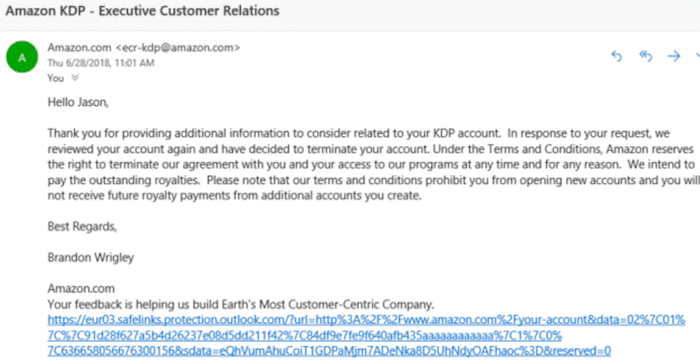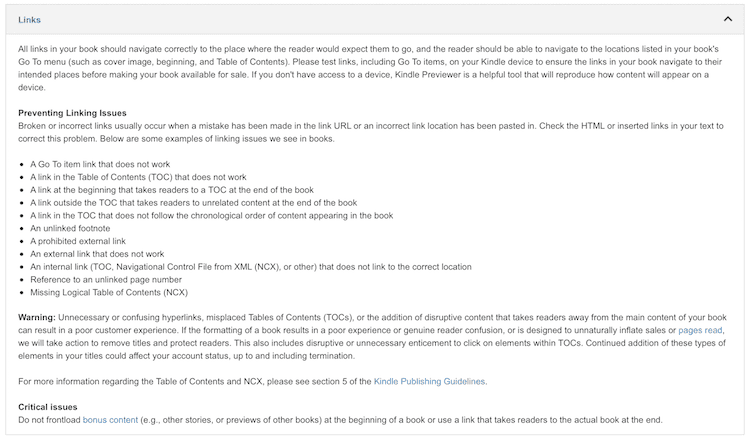
Kindle ebook scammers know that Amazon can’t count words or pages
Kindle Unlimited (KU) has one big flaw.
Amazon cannot count the words readers read, the number of pages readers flip, or the time readers spend on reading an ebook.
For readers, using their free trial or spending $9.99 a month on all they can read, it is not an issue.
But for honest authors, Amazon’s inability to calculate how many words and pages a reader indeed reads via their Kindle Unlimited subscription is costing them a lot of money.
Why? Because scammers and ebook stuffers using jump links are scooping up a sizeable percentage of the monthly pot, and Amazon is having all sorts of trouble dealing with it.
Amazon knows there is a problem, and as usual has reacted with a sledgehammer that has hit a few scammers, but also honest authors who had no idea that they had done anything wrong.
I can’t vouch for the honesty of the authors in this article on Yahoo News, but their stories ring true when you have a problem as an author with Amazon.
Particularly in the response from Amazon when you ask why, about anything?

If you ever want a definitive answer to why, don’t bother asking KPD help or Amazon Customer Relations because you will always get the same response. “Refer to our Terms and Conditions.”
Douglas Adams could well have been referring to Amazon in this quote.
“But the plans were on display…”
“On display? I eventually had to go down to the cellar to find them.”
“That’s the display department.”
“With a flashlight.”
“Ah, well, the lights had probably gone.”
“So had the stairs.”
“But look, you found the notice, didn’t you?”
“Yes,” said Arthur, “yes I did. It was on display in the bottom of a locked filing cabinet stuck in a disused lavatory with a sign on the door saying ‘Beware of the Leopard.”
But, you can go to Amazon’s Terms and Conditions, if you have hours to waste, or you are a lawyer, and try to understand.
On book stuffing, there is this page of rules. Well, at least it mentions something about 10%.
But to find out why you get your account suspended, well, then it gets difficult. After an hour of searching, this is the best I could find.

You can find the above section on this page if you scroll down to the section labelled, Links.
The key phrase in the email above from Amazon KDP Executive Custome Relations is this.
Amazon reserves the right to terminate our agreement with you and our programs at any time and for any reason.
In other words, if you are an author and you have a problem with Amazon KDP or KU, well, you can go suck eggs.
Amazon can terminate your account at any time without giving you a reason why.
But the scammers are having a wonderful time and making bucket loads of money
David Gaughran has written a lot of informative and in-depth articles about Kindle and KU scams. But this one on KU book stuffers, in particular, is well worth reading.
There is one image at the very end of the article that highlights another one of Amazon’s KU word and page counting problems.
It can’t account for extra paragraph breaks in a page. All the blank lines in this image below count as words read.
From KDP help: Non-text elements within books including images, charts and graphs will count toward a book’s KENPC.

All scammers have to do is fill a Kindle ebook with words (and lots of space), and have a jump link at the beginning to lure readers to the end of the book, and then, presto, the whole ebook is seen as read by KU and the scammers clean up.
KU page read calculation is so primitive that in fact, links in the table of contents perform the same action as a jump link, so how can Amazon tell the difference?
Why can’t Amazon count words, pages and time spent reading?
Because it is impossible.
An ebook is not dissimilar to a web page in the fact that you scroll from the top to the bottom.
If you use Google Analytics, you will know that Google can’t count the time a reader spends on a web page.
It can only record time if there is a trigger action such as clicking a link on a page or clicking a menu item to navigate to another page.
“Google Analytics Time on Page and Google Analytics Session Duration are typical examples, until you discover one not-so-obvious fact: Google can’t measure the time a user spent looking at the last page of their visit to your site.
This happens because Google uses the time of the next page view to determine the time you spent looking at the current page. On the last page, there is no next page recorded, so the Time on Page is unknown (recorded as 0) and the Session Duration ends when they opened the last page.”
Source
If a site visitor leaves a page open in a browser tab, for days even without a click, Google can’t calculate the time, so it records zero time for session duration.

It is why Google Analytics reports a longer time on an individual page than on a complete session.
But Google can record scroll depth quite accurately.

I believe this is how Amazon calculates KU ebook reading, and why the measurement is so unreliable.
Basing page reads on scrolling depth is why KU has such a problem with ebook stuffers. It cannot count words read or time spent on an ebook because it is in fact, one long page.
It can only record an estimation of reading based on how far a reader progresses through the ebook, but with no recorded measurement of time or speed.
So if a KU reader opens an ebook, starts reading chapter one and then clicks a link to go to the end of the book, KU records this as 100% progress.
It’s all a bluff, and when Amazon thinks it finds an author or two who know its all bluff, and profits from the weakness, Amazon reacts by taking the easy way out.
Amazon reserves the right to terminate our agreement with you.
Amazon needs to own up, but it won’t
KU scammers and ebook stuffers are not the real issues here.
It is Amazon’s inability to set clear, easy to understand guidelines and to be able to monitor and measure KU reading accurately that is the real problem.
Kindle Edition Normalized Page Count (KENPC) is an oxymoron because I don’t believe Amazon can count pages.
Until Amazon can find a better system to track and record KU ebook reading correctly, the scammers will keep finding ways to make money, and honest authors will lose out.
Or be terminated.
Previous answers to this question
This is a preview of an assignment submitted on our website by a student. If you need help with this question or any assignment help, click on the order button below and get started. We guarantee authentic, quality, 100% plagiarism free work or your money back.
 Get The Answer
Get The Answer